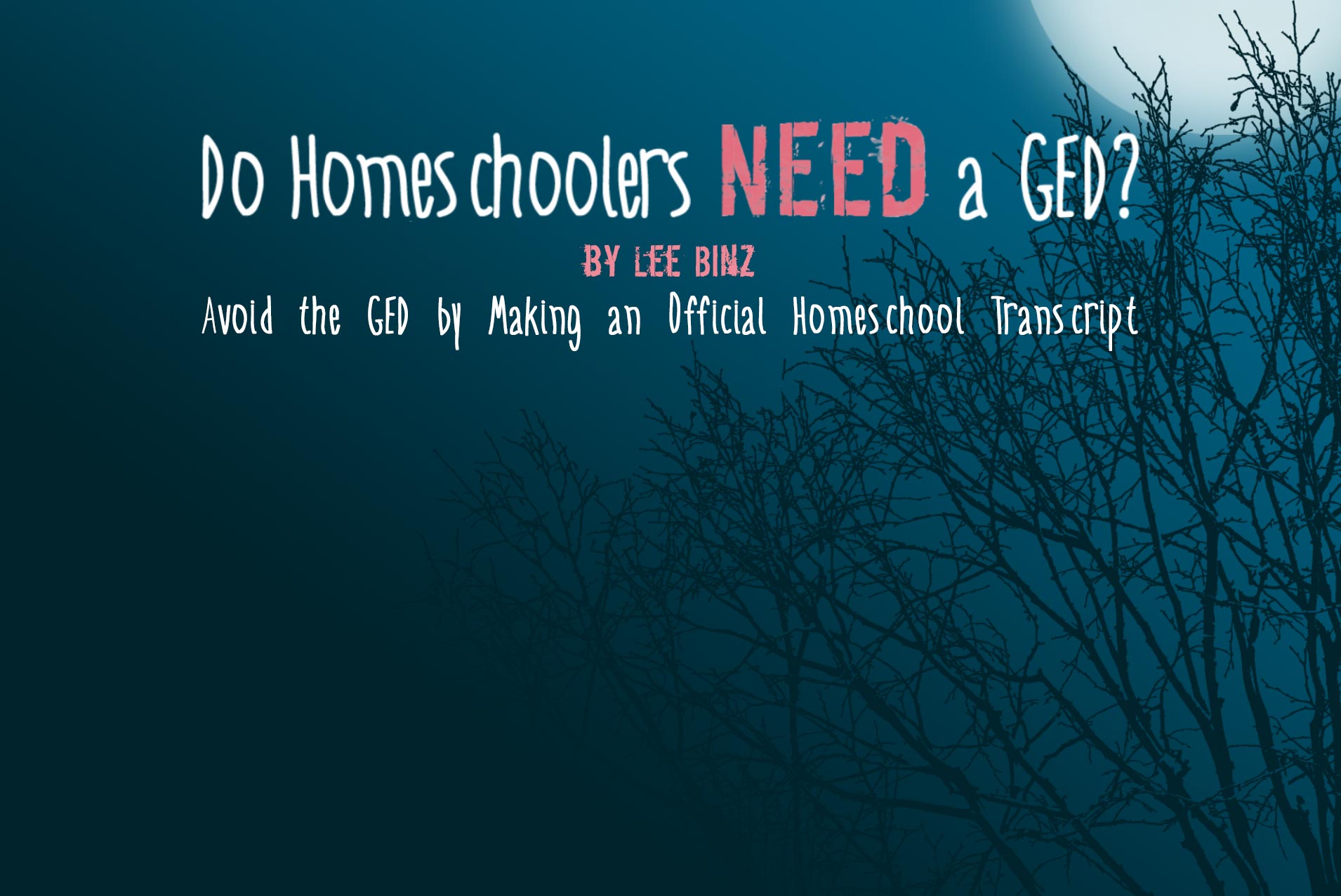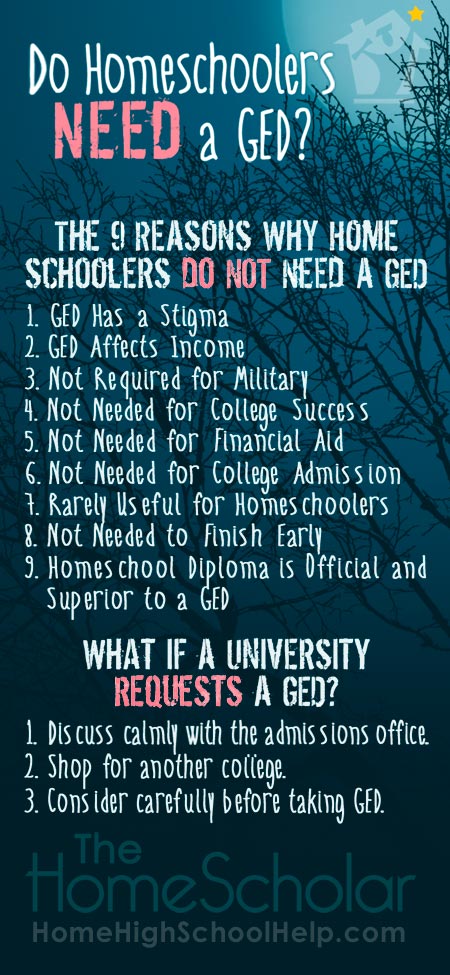Quick Links
Finish Your
Homeschool Transcript Now
1. What is GED exactly?
The GED® is used to demonstrate a student knows as much as a high school graduate. In the U.S., students must be age 16 and not currently enrolled in high school. It costs about $100 to $150, depending on the state. The GED® is about 7 hours long. It tests math (including basic math, geometry, algebra, graphs and functions), language arts (including reading, grammar, language, and a written essay), social studies (including reading and analyzing historical events and using numbers and graphs for meaning), and science (including the meaning of science, experiments, and using numbers and graphs).
2. Do Homeschoolers Need a GED®?
I get asked this question a lot and the answer is no. As homeschool parents, you can provide a high school diploma.
Your students are not dropouts and can be taught academics at home and receive a diploma when they graduate.
3. Does the GED® Have a Stigma?
Yes, there is a stigma with the GED®. The GED® implies a student did not complete high school and dropped out. It implies that the person needed to get a high school education without completing high school. A GED® implies “dropout.”
A homeschool diploma confirms successful high school graduation.
Meet your state homeschool laws for graduation. If no specific homeschool graduation requirements are stated, the parent may determine graduation requirements for their child, in consideration of normal educational requirements. It may include 4 English, 3 to 4 math, 2 to 3 sciences, 3 social studies, 2 foreign language, 2 P.E, 1 art class, and enough electives to add up to 19 credits or more overall. Standard graduation requirements vary widely between states and are usually less than the requirements needed to enter college.
4. Does the GED® Affect Income?
This is true regardless of sex, race and ethnicity, or age. GED® recipients earn $3100 per month on average, compared to high school diploma recipients who earn $4700 per month on average. People who do not have either a diploma or a GED® earn on average $2400 per month.*
5. Do Homeschoolers need a GED for Military Enlistment?
- Tier 1: High school graduates (including homeschool graduates) or non-graduates with some college credits.
- Tier 2: GED® students.
- Tier 3: Those with no education credentials.
The higher the tier, the higher their starting salary when enlisted. Giving your child a GED® can harm their military future. It’s best to provide an honest homeschool diploma when possible.
To apply for the military, your child must present a homemade homeschool diploma and may be asked to show your homeschool has obeyed local homeschool laws, including any documentation required by your school district (such as a declaration of intent to homeschool). Each homeschooler must also present a transcript. It must be clear that the parent directed the child’s education. A GED® causes unnecessary complications that can affect the student’s tier standing.
6. Do Homeschoolers Need a GED for College Success?
No. In fact, a GED® can negatively affect college success. Perhaps not the way you may imagine, though. Those with a GED® are less likely to experience college success. For people with a high school diploma, 73% go to college and 33% earn a college degree. Only 43% of GED® earners go to college and only 5% earn a bachelor’s degree. A college degree can dramatically increase monthly earnings. While you can debate which came first, the GED® or the ability to be successful, statistics show that the GED® does not make a successful student.*
7. Do Homeschoolers Need a GED for the FAFSA?
What does that mean? If you are homeschooling within your state homeschool law, then your student is eligible for federal financial aid. There is no need to take the GED®. The law states that students who have "completed a secondary school education in a home school setting that is treated as a home school or a private school under state law" can receive federal financial aid. When you fill out the FAFSA, the government will decide how much financial aid you should receive. Your child can receive financial aid as a homeschool student and does not need a GED®.
8. Do Homeschoolers Need a GED for College Admission?
9. Is the GED Useful for Homeschoolers?
If someone tells you that your homeschooler requires a GED® and will not listen to calmly expressed reason, please contact the HSLDA.
10. Should I Give My Child the GED to Finish Early?
11. What is a Homeschool Diploma? Is it Official?
While they may never be asked to show a high school diploma, adults will be asked if they have one. You don’t want your student to hesitate and say, “I don’t know, I’m homeschooled!” Instead, you want them to be absolutely certain their homeschool diploma is official. Present a high school diploma with pomp and circumstance confidently, so it’s a memorable event. A tangible diploma will help them remember their diploma is real and valid. In the working world, when the application asks if they are a high school graduate or have a high school diploma, the answer is YES.
Homeschoolers Do Not Need a GED for College Admission
Try to create change for your student and other homeschoolers. Read Homeschool Friendly vs. Homeschool Fussy: How to Handle Troublesome Admission Policies and Recognize a Homeschool Friendly College.
2. Shop for another college, one that is more homeschool friendly.
Colleges are increasingly learning that these sorts of policies are counter-productive and are changing them to be more accepting of homeschoolers. As homeschoolers in college become more common, colleges will feel growing pressure to take down barriers that discourage homeschool families. This is good news for families considering homeschooling high school.
3. Consider carefully before having your child take the GED®.
Choose this option if the university is your first-choice school, and no other college will do for your child.
Homeschoolers are not high school dropouts! Homeschool diplomas are recognized under the law, in accordance with state homeschool law, and are official. Homeschoolers can receive federal financial aid, like private and public school students do and are treated on par by most colleges and careers. Homeschoolers do not need a GED and your student can maximize their earning potential without it.
* Statistical Reference from U.S. Census: * Statistical Reference from U.S. Census: GED® Recipients Have Lower Earnings, are Less Likely to Enter College

 Login
Login








